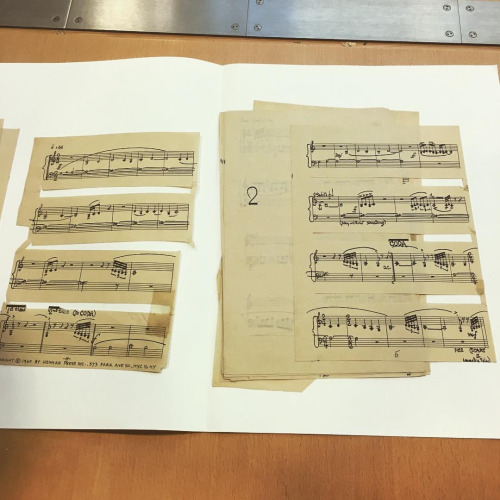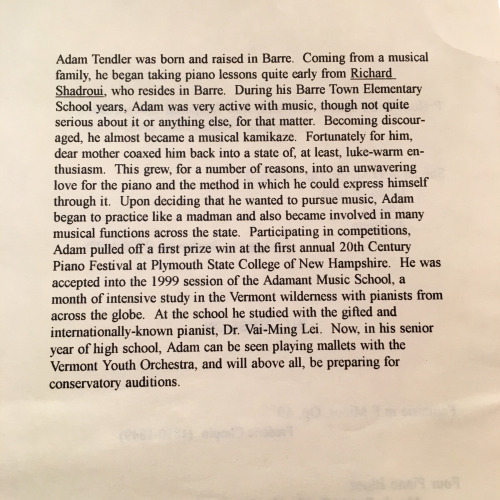Adam Tendler's Blog, page 27
May 10, 2016
thank your hecklers
All music is new music to somebody. The other day, a friend posted on my Facebook wall that her students’ eyes “nearly popped out when they saw all the screws in the piano” as she taught about John Cage’s prepared piano music. It reminded me that, yes, people out there still hadn’t actually heard of the prepared piano, just as I hadn’t heard of it until one day as a teenager when I stumbled upon a dusty LP in my high school library. These first-encounters happen every day.
I still find myself surprised by even centuries-old repertoire. My jaw nearly hit the floor when, last month, I saw Anthony Newman perform a Bach organ work I’d never heard that employed only the pedals for well over a minute. Revolutionary, I thought. And yet, he’d probably played the thing since he was fifteen years old.
Last Saturday I played a concert of John Cage’s music at the New York Public Library for the Performing Arts. Going into it, I felt a little insecure about the placidity of the program, a short series of mostly tranquil works interspersed with readings. These are the hits, I thought.
Well, two things happened:
1) Some people really loved the program, and had possibly never heard anything quite like it before. Wow.
2) Some people really hated the program, and had possibly never heard anything quite like it before. Wow.
I’d share the messages received since Saturday about how the concert touched certain people’s hearts and opened their minds to the breadth of Cage’s music and writing, but of course I’m drawn more to the small faction of (so I heard) elderly folks who created a disturbance throughout the performance. Hecklers, so I called them.
“Why don’t you shut up!” one person groaned as I answered a question asked by the curator of the series during an onstage interview.
“Look at him, he looks more miserable than I am!” another remarked during a particular moment of concentration.
“What do you want!” echoed through the hall during one of the more serene moments of the program, either during “Dream” or “In a Landscape,” perhaps in response to someone else asking this person to be quiet.
“This is ridiculous,” one person announced as I performed Cage’s Radio Music (1956) before the concert even started.
These were all “unusually overt distractions,” as one friend texted me later, and indeed I doubt that the interruptions came from individuals we’d describe as mentally stable—this was, after all, a free afternoon concert, and audiences for these affairs can be a mixed bag, to say the least—yet the chaos both helped make the afternoon, to be sure, a memorable occasion, but most importantly (and surprisingly) also reminded me that even what seemed like the most harmless of programs could still have the power to shake and provoke.
The composer Gerald Busby, who attended, wrote this to me: “You use the word hecklers, but I think those that made intrusive noises were actually just reacting to the beauty and terror of being present. They weren’t heckling you; they were heckling the intimate precariousness of being awake and alive if only for a few seconds.”
“The intimate precariousness of being awake and alive…” These words really got me. I often forget that we in the music community have the sacred opportunity to open the path toward absolute presence for our listeners, whether they embrace or reject it in the moment. Or if they even notice.
We all still remember those moments of first discovery from our virginal musical upbringings—and let’s hope we’re still open to such discoveries in adulthood—but now we have become the ambassadors of those moments. Is it really just a job? Can we actually call it a blessing?
I remember, the first time I heard Copland’s Piano Variations, I didn’t know what to do with the piece, but I was sure I didn’t like it. Within two years, though, it became the riptide that dragged me out to a sea of modern American music in which I still tread water. Now I hum it while walking down the street.
So I urge all of us to take nothing for granted, to avoid assuming that our programs are either commonplace or radical. We have the opportunity to make everything we play new, every time. To create from nothing an experience, a path, a riptide. Our assumptions are just that—guesses and fantasies—even the assumption that someone who disrupts a concert hates the music. After all, some people laugh at funerals.
Funny enough, the last piece I performed was the ‘silent’ 4′33″. No one made a peep.
May 6, 2016
Here’s the enigmatic and terrifyingly precious score to...

Here’s the enigmatic and terrifyingly precious score to Cage’s Suite for Toy Piano. This and other artifacts (including receipts for hardware!) on display TOMORROW at 2:30 for my free Cage concert / reading / discussion at NYPL for the Performing Arts @ Lincoln Center (prepared piano demo of 34'46.776" at 11:30). bit.ly/cagenypl (at New York Public Library for the Performing Arts)
May 4, 2016
(heart to heart with a 6 year old)
Him: Do you know every song on this piano?
Me: Not yet.
March 27, 2016
March 16, 2016
soho walking
There’s a certain part of a certain Scarlatti sonata that gives me such numbing chills when I think about it that I literally couldn’t just tell if I was wearing a hat or not.
February 15, 2016
stucky
Our music community is so wide, and yet we’re all connected in these myriad, unexpected ways. Part of me also expects everyone to just be around indefinitely, ready to bounce back an email or grab a coffee. A year ago almost to the week I met Steve Stucky for breakfast, not to talk about his Pulitzer Prize winning music or the major piece he was mounting in a couple months with Jeremy Denk, but rather to talk about one of his own teachers, the late Robert Palmer, and my interest in *his* obscure music and life. It was a small but deeply meaningful gesture that he met with me, and speaks to a generosity of spirit we should all aspire to. When I first glanced his picture this morning, without reading the text beneath I’d assumed he had won yet another prestigious award. For that split second I thought, “Yeah, I need to write him.”
January 15, 2016
hindemith thought while washing dishes
on what would’ve been the john cage’s hundredth birthday, i played his sonatas and interludes at symphony space. the director of the john cage trust attended the performance but said very little about it afterward. as she left, though, she turned to me and asked: “do you like hindemith?”
January 12, 2016
know what
burned, frozen
I don’t know what
but those cords
we used to talk
through
or on, they’re
I don’t know what
January 10, 2016
applause shame
I’ll probably never forget how it felt when, a couple months ago in Philadelphia, I pressed the final two simultaneous notes of Morton Feldman’s Palais de Mari and one of them didn’t sound. I had feared this would happen, and by the time I reached that final measure it seemed that my heart pounded louder than the music—not an unreasonable possibility with Feldman. It all came down, in my mind, to those two perfect tones—two tones that indeed I had already played in an earlier passage and thought: “See? You just played them, and played them perfectly… so that means you can play them again. Don’t you dare psyche yourself out three minutes from now."
But then it happened. Of course it happened. I failed to play two soft notes at the same time, something probably any toddler could do in their first piano lesson. I couldn’t…well, try again, and effectively compose a new ending to a classic work by Morton Feldman. No. I couldn’t do anything. I just counted the beats until the measure terminated. And then the worst part.
They began clapping. Yes, the whole room applauded. Some stood. I wanted to run straight down the aisle and out the door. Either that or start over. At the very least, I wanted to explain, to apologize. In any event, I didn’t want to bow. But I did. And I did again. And I accepted the warm words from those generous people, including even Feldman’s niece.
It was a long train ride back to New York, and I didn’t spare a single person who asked how the show went the story of those last two notes. Eventually I moved past despair to practical considerations about how I could prevent the same thing from happening next time. Next time. Always next time. Oh, how I prayed for a next time.
But you know, this happens to a certain extent after every performance. I locate an unforgivable offense, usually one that trumps a series of others, and then dig into it, digging into its origins, its implications, and all the reasons why it would never, ever conceivably happen to another pianist. Guilt, regret, shame. "It must be exhausting,” a friend once said. I’d never really thought about it. I thought it was the same for everybody.
People in the audience wept during a concert in which I played a couple nights ago. Thousands have watched a video of it and hundreds have weighed in with comments (though undoubtedly this is because I worked alongside a brilliant musician and intellectual who also happens to be a celebrity in the adult film industry). Still, I can’t bring myself to watch the concert nor peruse the comments, even though the ones I’ve glimpsed have glowed with positivity and moving testimonies. No, I still fear the discovery of someone who will call me out on a sloppy rendition of a piece that I actually know note-for-note. I know I can do better. I wish could do bett—
“You’re a textbook control freak,” said a composer friend a couple months ago. I didn’t expect it, but the reading gave context to what until then had felt like routine anguish. If I can’t control others’ perceptions of my work, I’ll stew, or avoid, or deflect, or try to beat them to the critical punch. Yes, I know that thing happened...
The person who emerges during performance is rapturous, selfless, primal and unapologetic, but also unpredictable and…yes, uncontrollable. When a piece ends and the applause starts, that performer disappears and the control freak sweeps in to assess the damage, eager to promise better behavior next time while excusing the mess. “Did he make a mess? Let me explain…"
Maybe I’m apologizing for the apologizing, or maybe, in identifying it, I can transcend a behavior that I fall back on but that doesn’t serve me in any productive way. Isn’t that what most of us would call a habit?
January 6, 2016
1/6/16
The other day in Vermont, talking to my first piano teacher, he asked, “So who from *that generation*"—meaning legendary modernist composers—"is still alive?”
I went through a list of every great modern composer who had died in the last twenty years, and then said, “…but Boulez. Boulez is still alive.”




